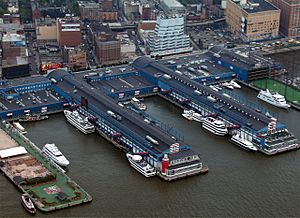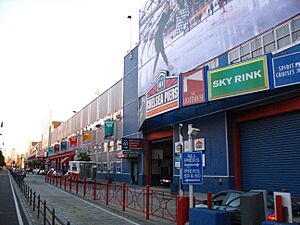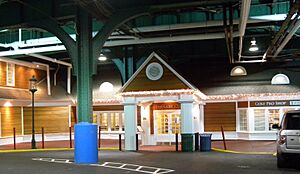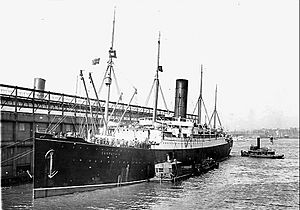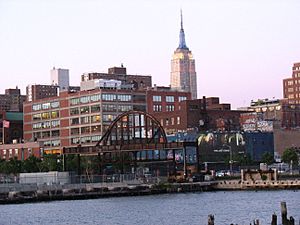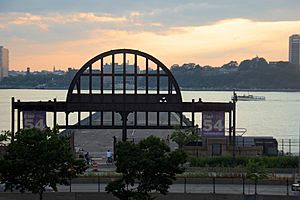Chelsea Piers facts for kids
Chelsea Piers is a group of large piers located in the Chelsea area of Manhattan, New York City. They are found on the west side of Manhattan, next to the West Side Highway and Hudson River Park, and right by the Hudson River.
These piers were first built in the early 1900s as a place for large passenger ships to dock. Famous ships like the RMS Lusitania used them. After the RMS Titanic sank, the ship that rescued its survivors, the RMS Carpathia, came to Chelsea Piers. The piers replaced old, worn-out buildings along the waterfront with grand new structures made of pink granite.
Today, Chelsea Piers is home to the Chelsea Piers Sports & Entertainment Complex. This huge sports area covers 28 acres along Manhattan's Hudson River, between 17th and 23rd Streets. It opened in 1995 and was paid for by private money. The complex includes:
- The Golf Club, which has a multi-story driving range.
- The Field House, with many different sports and training areas.
- Sky Rink, which has two full-sized ice rinks.
- The Chelsea Piers Fitness health club.
- Bowlero at Chelsea Piers, a bowling alley.
- Sunset Terrace, a place for weddings and other events.
The complex also has several event centers, film and TV production studios, and a marina called the Maritime Center for private boats.
Contents
History of Chelsea Piers
How the Piers Were Built
The term Chelsea Piers originally referred to the docking spots for large ocean liners in Manhattan from 1910 to the 1930s. As ocean liners like the Lusitania became bigger, New York City needed new places for them to dock in the early 1900s. The Army, which controls where piers can be built, did not allow any piers to extend beyond the existing river line. Shipping companies preferred to build south of 23rd Street because there were already important things like the New York Central railway and a ferry station nearby.
Some land along the waterfront had been filled in back in 1837, making Manhattan wider. But the city government took over this land and turned most of it into piers. This was a debated decision, and many businesses had to close. One market, the West Washington Street Market, stayed filled in. It later closed and became a sanitation facility for loading garbage onto barges. A small part of the old 13th Avenue still exists behind this facility, now a parking lot. This area is now called the Gansevoort Peninsula.
The new piers were designed by the famous architecture firm Warren and Wetmore, who also designed Grand Central Terminal. The city officially called this project the Chelsea Section Improvement. It replaced many old waterfront buildings with grand structures that had beautiful pink granite fronts. These piers became the main docking points for the rival Cunard and White Star shipping companies.
Famous Moments in the Early 1900s
Most of the big trans-Atlantic ships of that time docked at Chelsea Piers. The piers played a key role in the stories of the RMS Titanic and RMS Lusitania. The Lusitania left its Cunard Pier 54 in 1915 before a German submarine sank it. The Titanic was supposed to arrive at White Star Pier 59 when it sank. Survivors were rescued by Cunard's RMS Carpathia. The Carpathia first dropped off the Titanic's lifeboats at Pier 59. Then, it went to Pier 54 to let off the passengers and survivors. Thousands of people gathered at the dock to welcome the ship.
In the summer of 1920, a large rally took place at the White Star Line docks. It was held to send off Daniel Mannix, an Irish-born Archbishop from Melbourne, Australia. He had spoken out against English rule in Ireland and helped lead campaigns against military conscription during World War I. About 15,000 New Yorkers came to Pier 60 to make sure that Lloyd George would allow Mannix to travel to Ireland.
In the 1930s, a new row of luxury liner piers was built between West 44th and West 52nd Street. This was to handle even larger ships. After New York moved its main luxury liner piers to the New York Cruise Terminal in 1935 for huge ships like the RMS Queen Mary and the SS Normandie, the Chelsea Piers became a place for cargo ships. During World War II, the piers were used to send out troops. The piers suffered from big fires in 1932 and 1947, which destroyed some of the southern piers. New construction led to new cargo piers used by the United States Lines and Grace line.
In July 1936, Jesse Owens and the United States Olympic team left from Pier 60 on the SS Manhattan for the Summer Games in Berlin, Germany.
Chelsea Piers in Recent Times
In the 1980s, there were plans to replace the West Side Elevated Highway with a new highway at ground level. This plan, called the Westway, would have run over demolished piers. The main structure of Pier 54 was torn down in 1991, except for its archway entrance. However, the Westway plan was stopped after courts ruled that the new highway would harm striped bass fish.
After the Westway plan failed, the development of the West Side Highway split into two parts. The northern piers became the Chelsea Piers Sports & Entertainment Complex, used for fun activities. The southern piers are now part of the Hudson River Park. Construction of the Chelsea Piers complex began on July 12, 1994. Important people like New York Governor Mario Cuomo and New York City Mayor Rudy Giuliani attended the ceremony. The complex officially opened in August 1995.
After the September 11 attacks caused the collapse of the World Trade Center, emergency medical centers were quickly moved to Chelsea Piers. This center was closed on September 12, 2001, because it was no longer needed. Volunteers also ran a disaster recovery site at Chelsea Piers until September 16, 2001. They helped provide sleeping areas, food, and cell phones for volunteers working at Ground Zero.
Chelsea Piers Connecticut, the first expansion of Chelsea Piers, was built in Stamford, Connecticut. This new facility opened in July 2012.
Piers 54 and 55
Pier 54, located at Little West 12th Street and the Hudson River, is a historic part of Chelsea Piers. It is famous for its connection to the 1912 RMS Titanic and 1915 RMS Lusitania ship disasters, as it was used by the Cunard Line. Today, it is part of Hudson River Park. The pier was also used for troop ships during World War II. After the war, it was used for freight operations by companies like W. R. Grace and Company and United States Lines.
In 1998, the piers became part of Hudson River Park. Since then, they have been used for concerts and other events. In 2005, it hosted an art exhibit from The Nomadic Museum. Pier 54 was finally closed in 2011 because it started to fall apart.
In the late 2010s and early 2020s, a new park called Little Island was built where piers 54 and 55 used to be. Plans for this park, first known as Pier 55, were announced in November 2014. The plans were stopped in 2017 due to legal issues and rising costs. However, in October 2017, the park plan was brought back, and construction began in April 2018. Little Island opened to the public on May 21, 2021.
Chelsea Piers in Movies and TV
Many movies and TV shows have been filmed at Chelsea Piers.
- Chelsea Piers appears in the 1978 film Times Square.
- The Chelsea Piers Golf Club was featured in the 2010 Hollywood film The Other Guys. This included a high-speed chase scene and a helicopter landing on the golf driving range.
Several TV shows have also been filmed here:
- Shows from the Law & Order series have been filmed at Chelsea Piers. Both Law & Order and Law & Order: Criminal Intent were produced here for their entire runs. Law & Order: Special Victims Unit moved into the space after the original series ended in 2010. On September 14, 2004, a road leading to Pier 62 was even renamed "Law & Order Way."
- The Apprentice filmed three episodes at Chelsea Piers, including two finale episodes.
- The first four seasons of Spin City were shot in Studio D at Chelsea Piers.
- Pier 54 was the location for MTV's reality show Band in a Bubble. In this show, a band called Cartel lived inside a large "bubble" and wrote and recorded a new album in 20 days. Webcams showed their progress live online.
Chelsea Piers was also the main broadcast location for CBS Sports Network.
Images for kids
-
The RMS Lusitania at Pier 54.
See also
 In Spanish: Embarcaderos de Chelsea para niños
In Spanish: Embarcaderos de Chelsea para niños
 | Jessica Watkins |
 | Robert Henry Lawrence Jr. |
 | Mae Jemison |
 | Sian Proctor |
 | Guion Bluford |


